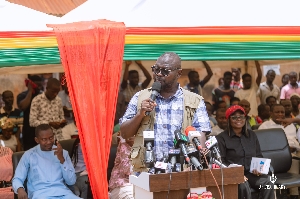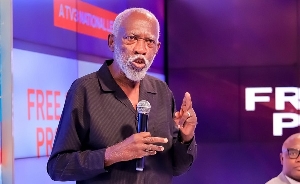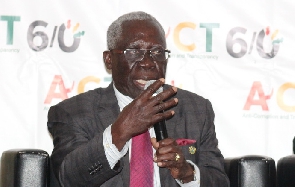The twenty first century has opened a new chapter in the administration of African countries. Democracy and good governance has become the drug that the western donors have prescribed to the ailing continent of Africa. It is generally believed that, the prescribed drug of good governance coupled with donor aid or assistance would lead to economic growth of Africa. Consequently, most African governments are trying to major the art of choreography in good governance before the live audience of western economic and financial mandarins in an attempt to please them. However, the melodies of good governance continue to elude a large number of ordinary Africans.
Governments all over the world do not freely render good governance until it is demanded by their citizens. It is therefore imperative for citizens to demand good governance from those they have elected into government to administer the affairs of the country on their behalf. Indeed it is an obligation for governments to offer good governance. It is therefore out of place for any ruling administration or government to exclusively set the parameters within which to measure good governance. It is the people who must measure the performance of their governments and to determine whether an executive government is rendering good governance.
Unfortunately, in Africa for example, it is difficult for some sections of the community to demand good governance. The culture of most African countries does not create room to openly criticise and demand accountability from leaders. The deification and the notion of the infallibility of the ‘King’ are so ingrained in the minds and sub-conscious of the African that, anyone who stands up to leaders rather becomes the culprit who must be incarcerated. This has led to even “democratically” elected governments running the affairs of Africa as chieftains. This endemic mind-set has over the years propped up very wicked, selfish and incompetent governments and thereby diminished the socio-political and economic growth of Ghana and Africa as a whole.
It is from this perspective that this writer intends to examine the concept and principles of good governance and also to deliberate on some developments that impinge upon good governance in Ghana and Africa.
Good Governance
Development practitioners have always found it difficult to define good governance. Interpretation of good governance has been influenced by the unique positions of people and the dominant needs that confront a country. However, it has been argued that, humans are rational and capable of comprehending wider common good. Locke therefore argued that, if people are rational, then the only way to justify imposing government over people is through their consent. Governance therefore is a limited social contract through which people agree to cede some of their powers to government but retain basic rights that the government cannot invade.
Daniel Kaufmann of The World Bank, in his presentation at Qinghua-Carnegie Conference on Fighting Corruption, Beijing, April 11-12th, 2002, defined governance as “the process and institutions by which authority in a country is exercised.” It is the process by which governments are selected, held accountable, monitored, and changed; it deals with the capacity of governments to manage resources efficiently, to formulate, implement, and enforce sound policies and regulations; and consider the respect for the institutions that govern economic and social interactions between government and citizens.
Development Report describes governance as “the exercise of power or authority -- political, economic, administrative or otherwise -- to manage a country’s resources and affairs. It comprises the mechanisms, processes and institutions, through which citizens and groups articulate their interests, exercise their legal rights, meet their obligations and mediate their differences”.
Furthermore, Aristotle in his simplified system classified good governments as those that best serve the general welfare; and, bad governments are those that subordinate the general good to the good of the individuals in power. In this sense governance is more than the operations of Government. It is concerned with the functions and operations of civil society, government, the private sector and all other institutions. The issues of good governance require the involvement of a large number of people, institutions and civil society organisations in decision making, in creating options, and in implementing country’s projects and programmes. Political will and commitment play very fundamental role in implementing good governance at all stages.
Good governance should be capable of measurement, analysis, and review by the public. The situation where external institutions which do not have the mandate of the people, and ruling executive governments set the rules and monopolise the parameters of measurement, undermine the very tenets of good governance. It is necessary for people to examine and measure the activities of their governments on areas such as accountability; political stability; absence of intimidation and violence; quality regulatory framework; effective and efficient Government; Control of Corruption; and, Rule of Law, etc.
Features of good Governance
The pillars that support good governance range very widely. In order to form a good opinion on good governance, it is necessary to have a quick scan of some views from other countries. A Commonwealth Secretariat – CIRDAP Workshop Report on Preparing Guidelines for Good Governance, held on 18-22 April 2004, Dhaka, Bangladesh, deliberated on various issues of good governance. The main objective of the workshop is to encourage participating countries to adopt good policies, develop good institutions and good management which will result in equity, efficiency, and empowerment with governance based on values, trust and transparency. It also emphasises good governance as a precondition for delivery of services and funds and stresses the relationship between government and Non Governmental Organisations (NGOs), civil society and private organisations which are central in tackling issues of poverty and participation. The experts who delivered papers at the workshops describe good governance from different perspectives. In the country papers on Bangladesh, the analysts attempted to demonstrate the relationship between governance and development, and identify problems of public sector management, and the role of NGOs in fighting poverty. Experts from India defined good governance in rural development, from rural local government perspective and in decentralised democratic structures. They also discussed quality of governance in reducing poverty and the role of Information Communications Technology (ICT) in ensuring good governance. The authors from Malaysia presented experiences in institutional reforms for improving social service delivery. Peoples Republic of Lao highlighted decentralisation, local administration and people’s participation. While governance for rural development was explained in Myanmar report. Pakistan paper explained good governance on how to promote private initiatives for Governmental Organisations and to utilise natural resources to benefit the poor. The experts from Filipino in their paper analysed gender mainstreaming towards gender-responsive governance.
It is clear from the above positions that, good governance is defined according to the needs and wants of a country and what they perceive as common good for the community. However, characteristics such as rule of law, decentralised decision making, pro-poor economic governance, sound public expenditure management, accountability, transparency, civil liberty, and information disclosure have been identified to be cardinal to good governance. Furthermore, good governance should be participatory, consensus oriented, responsive, effective and efficient, equitable and inclusive, and pursue the rule of law. It must be emphasised that the rules of good governance is not limited to the public sector but also for civil society organisations, private sector, and all others involved in community and national development and protection.
Good governance therefore must lead to the empowerment of people in order to enable them to construct genuine freedom and genuine development for themselves and their countries.
Good Governance from Western Donors’ Perspective
The Western donors such as the World Bank, International Monetary Fund (IMF), World Trade Organisation (WTO) and the G-8 most often equate good governance to effective management of economic resources.
The dominant discourse of good governance which is promoted by the World Bank, IMF and other advocates of neo-liberal economic globalisation, focuses primarily on the effective management of economic resources. According to John Samuel, this techno-managerial concept of good governance focuses on ‘decentralisation, transparency and report cards as ways to ensure macro-economic management as proposed by the Bretton Woods mandarins.’ This is largely apolitical in nature. The neo-liberal economic globalisation theorists often seeks to restructure governance systems, processes, and practices in such a way that policies and political processes especially in poor countries has the capacity of being controlled by the dominant powers.
As former Tanzanian President, Julius Nyerere, in his address at the Global Coalition for Africa (GCA), 13 October 1998 in Harare, Zimbabwe pithily stated that, to Western Donors good governance is a phrase which meant and means “those countries having multi-party systems of democracy, economies based on the principle of private ownership and of international free trade and a good record of human rights: again as defined by the industrialised market economy countries of the North.” Good governance therefore has been reduced to a matter between aid givers and aid seekers.
This paradigm fails to address the unequal and unjust macroeconomic framework that serves the interests of rich countries (western countries) and the dominant factions within a country. It therefore inherently perpetuates inequality and poverty. The neo-liberal economic globalisation proponents do not emphasise the notion of freedom and rights. This ‘good governance’ paradigm fails to ensure accountability and transparency of governments to its people but to global institutions like the World Bank, IMF, and G-8. By virtue of this concept, some unscrupulous governments are therefore wrongly perceived to have good governance according to the parameters of the Bretton Woods institutions, though its citizens were and are denied freedom, accountability, transparency and participation. The Bretton Woods’ institutions either ignore or fail to recognise that in practice, governance is a position of unequal and often unjust power relations, where power is reinforced through different shapes of marginalisation and oppression.
Rights-Based Approach to Good Governance
Conversely the rights-based approach to good governance is concerned with power-relationships within and outside institutions and is founded on the notion of accountability, responsibility and transparency (answerability). As stated by the Human Development Report, governance is “the exercise of power or authority -- political, economic, administrative or otherwise -- to manage a country’s resources and affairs. It comprises the mechanisms, processes and institutions, through which citizens and groups articulate their interests, exercise their legal rights, meet their obligations and mediate their differences”.
For any nation or society that is determined to fight poverty and injustice, the realisation of rights and justice through accountable governance is a prerequisite. Accountable governance is habituated on the premise of people who are empowered to ask questions (information disclosure), seek justice and claim participation. Consequently, accountable governance and empowered people especially the marginalised are integral to claiming rights and fighting poverty and injustice.
It is therefore imperative that governance is of critical interest to citizens, because it is the auditorium in which public policies are formulated, legitimised and executed. Furthermore, it presents the institutional platform to claim rights and seek justice through justice delivery systems. It is the podium through which citizens arbitrate and relate with the State and seek accountability. Governance therefore embodies the totality of power relationships within the social, political, economic and administrative arena of a country.
It has been argued that, the assertion of rights by people demands a transformation of power relations of governance. A theory and practice of good governance would have to be constructed on the pillars of distributive justice, human rights, public accountability, transparency, peoples’ participation and citizens’ legitimacy.
I will analyse the following points; Information Disclosure and Corruption; Development and Individual Rights; Participation; the Judiciary and Legislative system; Corporate Accountability; Global Governance; vis-avis some recent developments in Ghana and some parts of Africa. I will also explain a new concept “Democratic Coup’ and some historical antecedents and their effects on good governance.
Corruption and Information Disclosure
According to the Former Tanzanian President, Julius Nyerere, ‘without good governance, we cannot eradicate poverty; for no corrupt government is interested in the eradication of poverty; on the contrary, and as we have seen in many parts of Africa and elsewhere, widespread corruption in high places breed poverty.’ President of the World Bank, Paul Wolfowitz affirmed this statement by stating that ‘there are more than one billion people worldwide surviving on $1 a day and corruption threatens their hopes for a better quality of life and a more promising future.’ It is generally stated that poverty is an enemy of good governance, and a persistent poverty is a destabiliser. When poverty is shared in a grossly asymmetrical manner, or is widely seen as being unfairly distributed as the few who are in leadership positions indulge in conspicuous consumption, it makes claptrap of any semblance of good governance. Real or suspected corruption among political leaders often discredits the canon of good governance. It is even worse when corruption is widely spread in society.
Indeed corruption and poverty are bedfellows. Development analysts argue that where corruption is so pervasive and insidious in leadership and government institutions, poverty, crime, poor sanitation and diseases are dominant. It can therefore be inferred that the frequent spate of armed robbery, drug trafficking of unprecedented magnitude, and the re-emergence of guinea worm infection under the National Patriotic Party (NPPs) governance may be attributable to the state of corruption and poverty in the country. It is extremely worrisome for Ghana to be rated after Sudan, a war torn country as the most endemic in guinea worm infections. In addition, the former President of the USA, Jimmy Carter described Ghana as ‘exporting guinea worm infection.’
With regards to drug trafficking, the former Director of Bureau of National Investigation (BNI), and Narcotics Control Board, Mr. Kofi Bentum Quantson, succinctly summed up the relationship between drug trafficking and corruption in the country when he appeared before the Georgina Wood Committee in August 2006. He stated among other things that, ‘drug barons had intelligence services of their own, which surveyed the terrain of their countries of operation to identify the humans, the infrastructure and institutions of state that they could corrupt because they cannot survive without corrupting them.’ He further posited that ‘POLITICIANS were the first target of the barons in their corrupt trade.’ (Daily Graphic, Friday, August 25, 2006).
Furthermore, the international community tags Ghana as one of the major conduits for drug trafficking in the West Coast of Africa. A Central Intelligence Agency, (CIA) report on Ghana described Ghana as an “illicit producer of cannabis for the international drug trade; major transit hub for Southwest and Southeast Asian heroin and, to a lesser extent, South American cocaine destined for Europe and the US.” In addition, the Transparency International report also widely perceived the present NPP government and government institutions in Ghana as very corrupt.
Corruption is devastating to the growth of nations and prohibits the realisation of the hopes and aspirations of people and quells their quality of life. It is therefore impossible for any government that champions itself in the tenets of good governance to be seen as impotent in tackling corruption especially when it concerns public office holders. The public and civil society orgarnisations (CSO) also play very crucial role in fighting corruption. However, corruption that bothers on conflicts of interest and abuse of public trust by state officials, the only diagnostic tool of the public is observational facts and allegations. It is a fundamental responsibility of a government which has the investigative tools and legally constituted institutions to call for information disclosure to arrive at the truth. It is in this light that I view President Kuffour’s assertion that civil society should support allegations with evidence before investigation as unfortunate and a discredit to the principles of good governance.
It is therefore of great national concern that numerous and several corruption allegations leveled against government officials for the past six years, President Kuffour has not instituted a single investigation. It is of interest to note that, these allegations did not emanate from the opposition parties alone but from the media and members of the NPP as well. For instance, in 2005 parliamentary vetting, Honourable P. C. Appiah-Ofori, NPP MP for Asikuma-Odeben-Brakwa, brought fourteen witnesses to testify to the corruption of Honourable Isaac Edumadze, NPP MP for Ajumako-Enyan-Essiam and former Central Regional Minister. The Chairman of the Parliamentary Committee obviously refused to allow the witness to testify.
In 2006, then National Chairman of the NPP, Mr. Haruna Esseku was recorded on tape informing party members that a Multi-National Construction Company, Sonitra paid a bribe of over twenty billion Cedis (¢20 billion) i.e. approximately, US$2.5 million on the Tetteh Quarshie Interchange Project contract. This allegation is as serious as it is not only a breach of conduct of Multi-National Company contracts, but it also denies Ghanaians and posterity of quality work. The quality of work on the Tetteh Quarshie Interchange is evidently clear for all Ghanaians too see.
Other streets of allegations such as Volta River Authority (VRA) Strategic Reserve Plant which led to an alleged colossal loss of about $35 million to the state; Tema Metropolitan Assembly (TMAs) Computerisation contract and decommissioning of Kpone refuse dump site; Energy Commission’s Lease agreement for Headquarters building involving 7.5 billion cedis; Unimax MacMillan Contract involving $27 million; Over 3 billion cedi importation of mango seedlings; Accra Metropolitan Assembly (AMAs) Purchase of plastic dustbins worth 2 billion cedis from Apotosu Co. Ltd. without following due procedure; Management Consultancy contract to Telenor leading to huge losses to Ghana Telecom; Bambagate Scandal; and Sahara oil deal, have all been subordinated to the whims and caprices of few public office holders and thereby destroying the quality of life and future of so many. In fact, matters of conflict of interest and abuse of public trust require the invocation of articles 278, 284 and 286 of the Constitution by the President.
Information Disclosure
Information Disclosure is an act of revealing information that is secret or would normally be confidential. A government which genuinely practices good governance will appreciate the fact that, to safeguard against conflicts of interest and abuse of public trust by state officials, it is ethical for Governments to disclose necessary information to the people who own the sovereignty of the State. Article 1 of the Ghanaian Constitution clearly states that, ‘the Sovereignty of Ghana resides in the people of Ghana in whose name and for whose welfare the powers of government are to be exercised in the manner and within the limits laid down by the Constitution.’ Article 35 Clause 1 further states that, ‘sovereignty resides in the people of Ghana from whom Government derives all its powers and authority through this Constitution.’
The foundation of information disclosure in governance is the belief that the government is accountable for its actions and that the public possesses a right to obtain information about those actions. In the United States for example, the Freedom of Information Act (FOIA) 1967, was amended to add strength to the statute in the wake of the Watergate scandal in 1974.
Nevertheless, some recent developments call for questioning the seriousness of the government to adhering to these fundamental principles of information disclosure. Parliament recently requested to know from the Governor of Bank of Ghana, Mr. Paul Acquah the cost or the anticipated expenditure of the redenomination of the currency which is supposed to take effect in July 2007. Similar question was posed to the Chief of Staff and Minister of Presidential Affairs, Mr. Kwadwo Mpianim with regard to the contract sum (estimated cost) of the Presidential Mansion, which was currently under construction. These are projects of financial magnitude. Astonishingly, the Governor and the Minister of Presidential Affairs would not inform Parliament of the costs of these projects. In addition, the contract sum of the National Identification Card Project remains unknown.
These are very dangerous signs under the current democratic dispensation. Indeed this attitude of non-answerability and unaccountability to the tax payer has intoxicating elements of corruption and threatens the health and quality of our democracy. These actions are very prejudicial to the national interest. It is the fundamental right of shareholders of corporate Ghana to demand full disclosure of all the necessary financial information about these and any other future projects which will significantly alter the financial coffers of the State.
Indeed President Kuffour in his recent 2007 state of the nation address categorically questioned the opposition parties’ for “excessive” demand for disclosure, involvement, and prudence in the nation’s finances. He accused them of knowing ‘the cost of everything and the value of nothing.’ By implication, the President is telling Ghanaians that, the value of projects and programmes being carried out by his administration can be determined without considering its costs. For the first time in the history of Ghana, value or usefulness of a project can be determined without taking into account, how much money is traded in return. Indeed the nation is operating with a bottomless financial pot where the government is not financially accountable to the citizens whose taxes are used for such projects. Does this proffer good governance?













